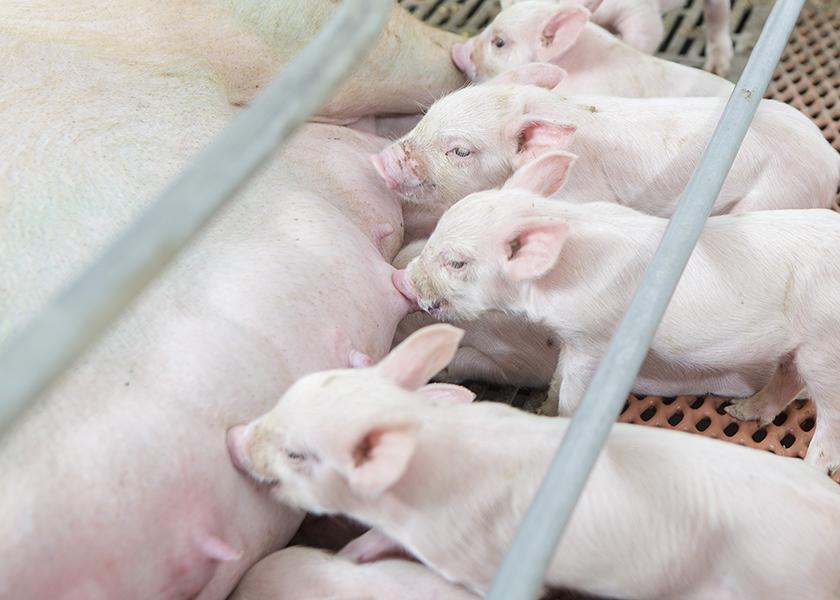Report Shows California’s Prop 12 Could Increase Sow Deaths, Create Costly Pork for Consumers

A recent report by the California Department of Agriculture (CDFA) shows Proposition 12 in California could lead to higher mortality in hogs while providing no added benefit for consumers, claims The North American Meat Institute.
On Tuesday, The Meat Institute, whose members consist of those involved in processing and packing of animal proteins in the U.S., said that CDFA details of the proposed rule late last month. The report showed the estimated costs and benefits showed Prop 12 could produce unintentional consequences.
CDFA released the details of Prop 12 in a notice posted nearly two years after it was originally due. It goes back to a ballot initiative passed in California in 2018. The new guidelines are set to take effect in 2022.
The Meat Institute said after reviewing the details, the proposed rule could not only increase mortality rates but may add nearly $100,000 in costs per year for a typical breeding farm.
Amanda Adam, a pork producer in Washington, Iowa, says while pork producers across the country continue to stay vigilant with biosecurity and other concerns on the farm, Prop 12 is another issue on their minds.
“My biggest concern about things like Prop 12—it's not that we can't comply with what they put forth,” says Adam. “But it would be a crazy use of resources for something that has no more scientific evidence than it does.”
Adam says after reviewing the standards put forth by California, she still doesn’t see how the Proposition is scientifically based.
“We're talking about the maternal animal that houses a pig,” she adds. “So the pig that is going to become pork, we're talking about how its mother was being housed while she was gestating with that pig. And quite frankly, I'm having a hard time connecting what that has to do with pork quality on the animal that is coming from her.”
The Meat Institute says in addition to added costs, the CDFA shows the proposal does not directly impact human health, the welfare of California residents or the State’s environment. Instead, it could increase the cost of food. According to The Meat Institute, other key findings from the CDFA notice show:
- Estimated costs for businesses to comply regarding pork: “Estimated ongoing cost is greater than the initial cost of conversion at $100,000 per year for a typical breeding pig farm due to smaller inventory of breeding pigs, lower piglet output per animal and increased breeding pig mortality.”
- CDFA acknowledges that animal confinement space allowances prescribed in the Act (cage-free for egg-laying hens, 43 square feet for veal calves and 24 square feet for breeding pigs) “are not based in specific peer-reviewed published scientific literature or accepted as standards within the scientific community to reduce human food-borne illness, promote worker safety, the environment, or other human or safety concerns.”
- CDFA also identified higher costs for schools, universities, prisons, and county jails. And discussing “benefits to human health, worker safety, or the State’s environment,” CDFA said “the Department has made an initial determination that the proposed regulatory action will have significant, statewide adverse economic impact directly affecting California businesses, including the ability of California businesses to compete with businesses in other states.”
- The agency identified Prop 12 is likely to force low-income consumers to pay more for food. “Covered pork, and especially covered egg products, will become more expensive to consumers starting in January 2022 because of the animal confinement standards mandated in statutes. … Therefore, the Act will disproportionately reduce food purchasing power of low-income consumers. … Food consumers most affected will be those low-income consumers who are not enrolled in assistance programs.”
National Pork Producers Council (NPPC) is also fighting California’s Proposition 12. Neil Dierks, NPPC CEO, says California’s initiative could dictate how pork is produced across the entire country.
“You have entities in California trying to figure out how are they going to do this. And the proposition of this whole thing was the fact that in order to sell product, it had to meet these requirements from Prop 12. It didn't say this is just California producers, it said any pork sold. So, it's in a tremendous amount of uncertainty in the industry. And that will continue,” says Dierks.
The NPPC CEO says that’s why the organization already filed a lawsuit.
“If we're not successful, our intent is to ask the Supreme Court to review this, because of the issue of California telling producers throughout the United States what their production system should be. Our position has always been that producers should have choice on what works in their farms, and consumers should have choice,” adds Dierks.
The Meat Institute says Prop 12 is also legally flawed. The Institute issued a reply brief that showed the Ninth Circuit’s decision to uphold California’s Proposition 12 directly conflicts with legal precedent in other circuits and the Supreme Court itself. The Meat Institute also already filed a petition for a writ of certiorari asking the Supreme Court to review an earlier ruling of the U.S. Court of Appeals for the Ninth Circuit in the Meat Institute’s challenge to the constitutionality of California’s Proposition 12: The Farm Animal Confinement Initiative.







